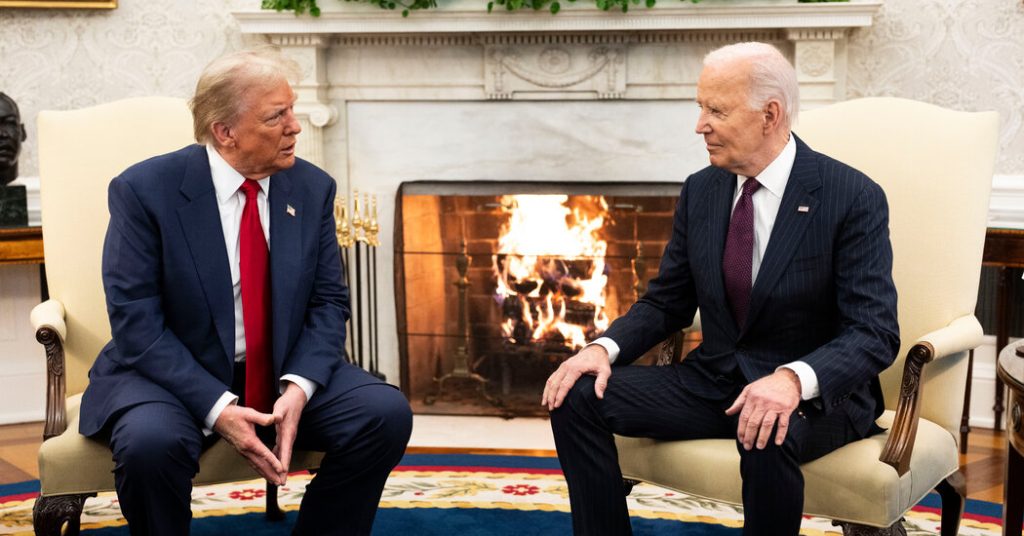The announcement of a Gaza cease-fire deal, achieved after arduous negotiations, is remarkable not only for its substance but also for the unlikely partnership that made it possible. Presidents Joe Biden and Donald J. Trump—polar opposites politically and personal rivals—momentarily set aside their mutual antagonism to collaborate on a shared goal: ending the deadliest conflict in the Israeli-Palestinian history and freeing hostages held for 15 months. The cease-fire is set to begin just one day before Biden hands over power to Trump, marking a rare moment of cooperation during a presidential transition in the deeply polarized political climate of the United States.
Both leaders had clear motivations for arriving at a resolution before the transfer of power. For Biden, the deal represents a capstone achievement of his presidency, allowing him to leave office with a significant foreign policy success. As the conflict’s toll mounted and hostages remained captive, Biden worked tirelessly to orchestrate a deal that could bring both peace and liberation. For Trump, securing the cease-fire removes one of the thorniest international crises from his agenda as he re-enters the White House. This way, he can focus on other policy priorities during his upcoming second term.
Despite the underlying political calculus, their collaboration cut through Washington’s usual dysfunction, where outgoing and incoming presidents rarely coordinate efforts, even in times of crisis. Predictably, however, the announcement quickly reignited familiar political battles over credit. Trump, true to form, jumped out ahead with an enthusiastic social media post, claiming the deal was the result of his November election victory and portraying the breakthrough as solely his achievement. Biden, adopting a more statesmanlike tone, emphasized the teamwork between the outgoing and incoming administrations but bristled at suggestions that Trump deserved equal credit. “Is that a joke?” he quipped when reporters raised the question.
Even so, the very existence of this bipartisan effort surprised many. Mara Rudman, a former deputy special envoy for Middle East peace during the Obama administration, called it extraordinary. “It’s shared credit, and part of the reason it worked is that it’s shared,” she noted. Still, Rudman was realistic, acknowledging that the political stars aligned in this circumstance because resolving the issue was in everyone’s best interests.
The final agreement closely resembled a proposal Biden’s administration had put forward as early as May 2023. His special envoy for the Middle East, Brett H. McGurk, spent months trying to navigate its terms through Israeli and Palestinian resistance. Yet, when Trump’s return to power loomed, it added urgency to the negotiations. Trump’s vocal and aggressive stance—he warned “all hell will break out” if hostages were not freed by the swearing-in ceremony—changed the calculus for both sides in the conflict. This is particularly true for Israeli Prime Minister Benjamin Netanyahu, who could not count on automatic U.S. support under Trump should he prolong the conflict unnecessarily.
Interestingly, Netanyahu’s reactions underscored these shifting dynamics. He reached out to thank Trump first after the deal’s announcement, citing the president-elect’s commitment to working with Israel to ensure that Gaza wouldn’t remain a haven for terrorists. Biden, meanwhile, was mentioned almost as an afterthought in Netanyahu’s statement, indicating the tense and complicated nature of his relationship with Israel’s prime minister.
This shaky partnership between Biden’s and Trump’s teams carried through to the negotiation table. Trump’s special envoy to the Middle East, real estate developer Steve Witkoff, joined forces with McGurk, using Trump’s influence as leverage. The collaboration, initially viewed warily by Biden’s team, ultimately helped close the deal. Some even reluctantly acknowledged Trump’s role in finalizing the agreement. “This was Biden’s deal,” former Democratic Representative Tom Malinowski admitted, “but as much as I hate to say it, he couldn’t have done it without Trump.”
Meanwhile, there were rare moments of bipartisan camaraderie in Washington, with figures like Republican Senator Thom Tillis praising the joint effort. Such moments stand in stark contrast to historical examples, where political transitions often exacerbated crises. In the waning days of Herbert Hoover’s presidency, Franklin D. Roosevelt shunned coordination on the Great Depression out of concern for being tied to Hoover’s policy failures. A more poignant comparison lay in Jimmy Carter’s last-ditch efforts to secure the release of 52 American hostages in Iran after his 1980 election defeat. Carter’s negotiations were unsuccessful before Reagan’s inauguration, and the hostages were only released moments after Reagan took office—a dynamic Biden’s team sought to avoid.
The circumstances of this cease-fire negotiation had dramatically evolved since Biden’s initial proposal. Throughout 2023, Israel systematically weakened Hamas, Hezbollah, and other adversaries linked to Iran. Although Hamas put up fierce resistance, its isolation grew as the Lebanese-Syrian-Iranian alliance fractured and other regional actors stayed neutral. A Biden-brokered cease-fire in Lebanon earlier in the year further strengthened Israel’s strategic position, leaving Hamas unable to sustain its struggle. Yet, even with these favorable changes on the battlefield, it was the looming transition of U.S. leadership that forced the final diplomatic push.
Trump’s changing rapport with Netanyahu also played a role. In his first term, Trump had aligned firmly with Netanyahu, cutting aid to Palestinians, relocating the U.S. Embassy to Jerusalem, and facilitating Israel’s normalization with Arab states. But their relationship soured during Trump’s last year in office when Netanyahu congratulated Biden on his 2020 election win—an election Trump still disputes. Over the past year, Netanyahu sought to rebuild his alliance with Trump, perhaps further incentivizing him to accept the cease-fire deal before Inauguration Day.
For Biden, his grievances with Netanyahu stemmed from suspicions that the Israeli leader was delaying the cease-fire to hand the credit to Trump, a potential move to curry favor with the incoming president. While Biden refrained from voicing these thoughts in his public statements, the strain was palpable. Nonetheless, the relief in securing a breakthrough was evident when Biden addressed the nation, flanked by Vice President Kamala Harris and Secretary of State Antony Blinken. “I’m deeply satisfied this day has finally come,” Biden said, emphasizing the deal’s importance for Israeli hostages, innocent Gazans, and wider regional stability.
Although Biden acknowledged that the deal would primarily be implemented under the Trump administration, he asserted its origins clearly. “This deal was developed and negotiated under my administration,” he noted. He emphasized how his directive for his team to coordinate with Trump’s staff exemplified what “American presidents do.” Biden’s understated criticism of Trump’s bombastic claims highlighted the underlying tensions. In contrast, Trump made no mention of Biden’s groundwork in his celebratory social media posts. Typical of his self-aggrandizing style, Trump portrayed the agreement as a triumph achieved solely through his looming return to power, asserting that even greater victories lay ahead in his second term.
The cease-fire deal underscores a rare alignment of interests between two fiercely opposed administrations. While the collaboration is unlikely to be repeated on other issues, it highlights how shifting political dynamics, strategic necessity, and a looming deadline can compel uncommon partnerships. The war in Gaza might finally be ending, but the broader lessons from this episode—of leadership, rivalry, and cooperation—will resonate far beyond January 20. For now, both presidents can claim credit, however begrudgingly it might be shared.












